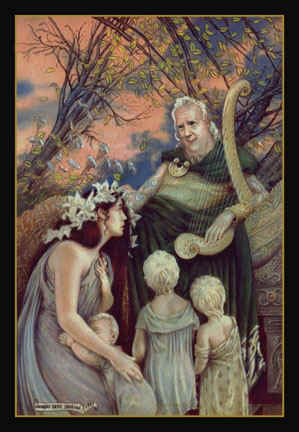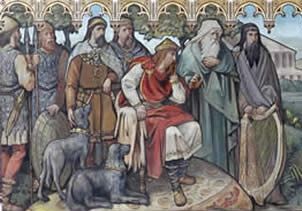The other Day I talked about the festival to Eriu that I celebrate. This time I thought to talk more about the Goddess herself as she is one of the main Gaelic deities that I honor.
Eriu has two other sisters, Fotla and Banba; though some stories put her having the Moriggan as sisters as well. Like many female goddesses in Ireland she is a sovereignty goddess. Though she and her three sisters are sovereignty goddess of all of Ireland. Eriu is the reason why Ireland is known in Irish as Eiru, Her sister's names give a more poetic form to the island as well.
The myth of how this came to be also illustrates one of the theories of the dead in Irish thought. When the Millisens came to Ireland, their leader Donn met with Eriu and her two sisters. He asked them for his support in coming to Ireland, and each sister gave their support though Eriu gave the most. However, Donn was an arrogant man who insulted her and her sisters. So for Donn's inhospitality he became the first person to die in Ireland.
Eriu is also associated with Flaith Érenn within the story Baile in Scáil. Here, She gives Conn the cup of sovereignty. Micheal Enright in her book Lady with the mead cup, that this is a reflex of an older ritual in which a woman acts as both prophet and king-maker. Again, showing Eriu's link to Ireland as a whole.
So I honor her by remembering my own heritage; such as supporting in what ever way I can to preserve the Irish Language. But also by looking to help take care of Ireland. Charities that can help reforest, clean and in general take care of the land are something that is one way of honoring her.






